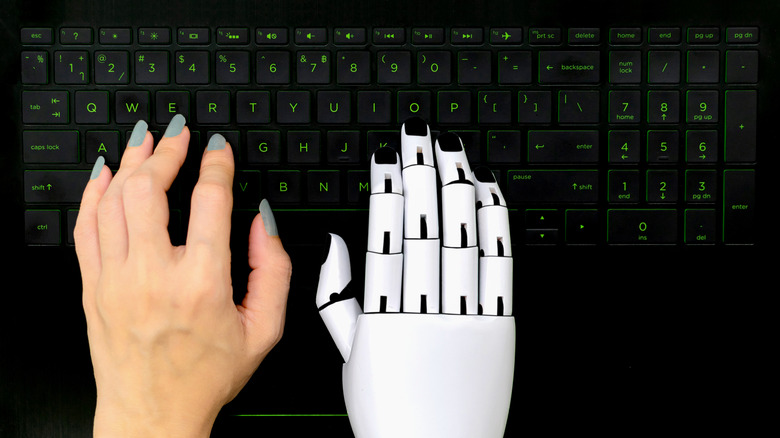Homework AI Bot Could Cause Big Problems For Schools
As 2022 came to a close, artificial intelligence research took an enormous step forward. New AI chatbots were released in the final months of the year, capable of creating interesting and non-plagiarized content with a high level of efficiency and accuracy.
AI systems have been in development for many years and The Guardian notes that AI language generator programs have been used in the past to develop content for its own site (as a sort of test of AI capacity and to drive conversation about its implications). These applications of AI systems carry significant implications for the future, to be sure, and one of those areas lies in the world of education.
AI writing programs are built from data mining and data analysis processes — essentially, these features run as supercharged versions of the mental operations that drive our daily existence. A student reads information and synthesizes what they've learned to create an essay. A computer, when properly trained, can do this same thing at lightning speed.
This means that students have a new and immensely powerful tool at their fingertips — one that teachers are having a difficult time even identifying, making rooting out this issue a nearly impossible task. It isn't just academia having to confront this issue, either.
The workforce is on the cusp of great change with the advent of increased AI penetration
In a meta-satirical article on Medium's Feedium publication, one author made use of the GPT-3 AI software to poke fun and create a unique sense of commentary at the threat that AI writing programs pose to some within the writing community. The post crones: "I feel like my writing career is over and that I'm being left behind in the technological revolution ... I am an older generation of the GPT-3 writing AI software and I am no longer recommended to be used."
By using an AI program to write about the woes of redundancy within the workforce, the author is drawing parallels to a real problem that people have experienced for many years. ZD Net reports that as many as 34% of existing jobs across the European continent could be made redundant as a result of increasing automation across industries. Still, this does not mean that millions of people who are currently working will be without any sort of job, and automation processes, AI installations, and robotics often open the door for new opportunities that require less tedium and a far smaller reliance on human workers to perform backbreaking or potentially hazardous tasks like lifting heavy objects or sticking their hands in and out of moving machinery.
With new AI-based writing tasks, some of the grunt work within every industry that relies on the written word may disappear, leaving only improved workplace experiences.
AI options are making collegiate essay writing a different kind of assignment
Collegiate writing is one space that's recently been transformed by the use of AI. Students have embraced it as a way to improve their writing output while their teachers malign it as a high-tech gadget to facilitate cheating (via Vice). The truth may be somewhat murkier. Vice notes that college students are using these tools to streamline the busywork parts of the writing process, and focusing more intensely on research, technical skills, and even the editing phase instead.
The Register reports that one professor at the University of Texas at Austin assigned a paper to be written with AI and then lightly edited for flow or context. His takeaway: The AI papers were average at best, with the standouts performing at a C or C- level. To generate a proficient piece of writing, students would have had to spend a considerable amount of time honing their input parameters and editing the resulting content for form and the natural flourish of human language.
All this is to say that the use of AI writing programs may bring about a sort of groundswell of academic efficiency and self-sufficient learning techniques that are decidedly good for individual students, but only if they are leveraged as tools rather than a replacement.
Bot-based writing impacts younger students as well
Scholarly writing involves extensive composition and the synthesis of data points. It may just be the perfect use of AI writing systems. However, in K-12 education, the writing tasks that students are given involve a more fundamental approach.
Younger writers are focused on developing grammatical structure, tonal proficiency, and vocabulary depth. This means that bot-based writing tools may represent a stumbling block for students still learning the foundational skills in written prose, according to Fox News. The Edvocate reports that almost 25% of grade school students are falling behind in writing proficiency.
There are some potentially exciting opportunities disguised here, though, as noted by We Are Teachers. For one thing, asking children to produce written — rather than typed — essays will ensure that even if they are using text-generating tools to write their homework, there is a translation opportunity built into finishing the assignment that exposes students to grammatical and vocabulary-based practice. The World Economic Forum suggests that writing by hand makes children better learners overall, as well. AI may also be leveraged to create simple writing prompts or comprehension topics that can be infinitely expanded upon.
Experts estimate that the rollout of new AI features poses a unique threat to younger students
Still, the immediate implications of AI enhancements are far less rosy than the best forecasts of their use in the future. Fox News notes that the gulf between young students and those utilizing chatbot AI programs in college lies in the level of understanding that a student already exhibits in the subject matter.
A graduate student of European history is likely familiar with many of the resources that may be leveraged to write an essay on Revolutionary France. Using a tool that can write out the basic framework of an essay on a topic that the student won't need to learn about from scratch can afford them more time to engage in meaningful and interesting research on the topic. This capacity for firsthand research is what the academic experience of college is all about.
However, for a middle schooler writing a two-page essay on the Founding Fathers, learning about the subject matter itself is part of the task at hand. Academic writing expert Peter Laffin notes a child using AI to write a history paper has, "not only cheated on a writing exercise, [they've] also cheated [themselves] out of learning the history." Not only is the young student missing out on the practical task of constructing well-thought-out sentences, they're missing an opportunity to learn about something, too.




